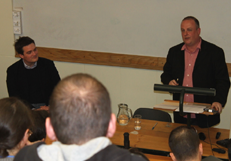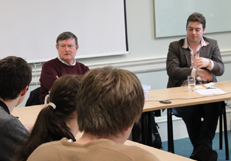John Aubrey
 Digital Calendar and Scholarly Edition
Digital Calendar and Scholarly Edition
People involved: Kate Bennett, Rhodri Lewis, Will Poole, Kelsey Jackson Williams
John Aubrey (1626–97) was one of the foremost gatherers and disseminators of learning in late seventeenth-century England. The author of the celebrated Lives, Aubrey was also a pioneer of archaeology and antiquarianism, and was a member of the fledgling Royal Society. In describing himself to others, he often quoted a line taken from Horace: ‘I perform the function of a whetstone, which can make the iron sharp though is itself unable to cut’.
Aubrey was too modest, but one of his greatest contributions to intellectual history meets exactly this description: namely, the extraordinary body of correspondence that he accumulated and would bequeath to the Ashmolean Museum (which in turn passed it to the Bodleian Library in 1860). His correspondents ranged from philosophers like Hobbes and Locke, to scientists such as Newton, Wren, Hooke, Petty, and Halley, to literary figures like Thomas Browne and Henry Vaughan, to antiquarian scholars such as Edward Lhwyd and Elias Ashmole. Furthermore, their social and geographical diversity attests that early British ‘science’ was as much the province of Somerset, Merioneth, or Yorkshire as it was of Oxford, Cambridge, or London.
Rhodri chairs Alan Stewart.
Will chairs Noel Golvers.
‘Aubrey chewed over aspects of alchemy, architecture, mechanics, mathematics, natural history, educational reform, artificial language planning, archaeology, topography, politics, local history, philosophy, and church governance – to say nothing of horticulture, musicology, and astronomy …’
Aubrey’s range of epistolary acquaintance is remarkable enough, but is overshadowed by the variety of subjects that he and his correspondents discussed. Writing from 1654–96, they chewed over aspects of alchemy, architecture, mechanics, mathematics, natural history, educational reform, artificial language planning, archaeology, topography, politics, local history, philosophy, and church governance – to say nothing of horticulture, musicology, and astronomy. Yet Aubrey’s letters are also unusually alive, and give us a colourful picture of what it was like to live and write in late seventeenth-century England. This is because Aubrey was at least as animated by gossip as he was by ideas, something vividly demonstrated in the correspondence he exchanged with the historian Anthony Wood. This formed the basis for the first monument of English national biography (the Athenae Oxonienses), and comprises the largest single portion of the letters as they now survive.
Rationale for Inclusion
Despite the importance of Aubrey’s letters, they have not been studied in any depth and have generally been overlooked by scholars in related fields. This is because more than eighty-five percent of them have never been edited or published, something that counts as one of the great oversights of early modern intellectual and literary history. Of around 845 extant letters sent to or from Aubrey, at least 810 are now housed in the Bodleian Library, chiefly within the Aubrey, Wood, and Ashmole manuscript collections. Under the editorship of Kate Bennett, Rhodri Lewis, and Will Poole, Cultures of Knowledge proposes fully to exploit these holdings for the first time, producing a four-volume scholarly edition of the letters, a digital catalogue, and an associated doctoral thesis.
Outputs & Presentations
Primary Outputs
- The Correspondence of John Aubrey (1626-97), eds. Kate Bennett, Rhodri Lewis, and William Poole. 4 vols (2014/15).
- Kelsey Jackson Williams, ‘John Aubrey’s Antiquarian Scholarship: A Study in the Seventeenth-Century Republic of Letters’ (DPhil, University of Oxford, to be submitted Summer 2012).
- Digital catalogue of the correspondence of John Aubrey within Early Modern Letters Online.
Recent Secondary Outputs
Kelsey Jackson Williams and William Poole, ‘A Swede in Restoration Oxford: Gothic Patriots, Swedish Books, English Scholars’. Submitted to Lias.
- Kelsey Jackson Williams, ‘Training the Virtuoso: John Aubrey’s Education and Early Career’. Accepted by The Seventeenth-Century (Forthcoming 2012).
- Kelsey Jackson Williams, Review of The Life of Anthony Wood in His Own Words, ed. Nicolas K. Kiessling, Notes and Queries (Forthcoming 2012).
- Kelsey Jackson Williams, Review of Sir Thomas Browne: The World Proposed, ed. by Reid Barbour and Claire Preston, and ‘A Man Very Well Studyed’: New Contexts For Thomas Browne, ed. by Kathryn Murphy and Richard Todd, Notes and Queries 57 (September 2010), pp. 437-440.
- William Poole, John Aubrey and the Advancement of Learning (Oxford, 2010).
- William Poole (curator), My Wit was Always Working: John Aubrey and the Development of Experimental Science (Exhibition, Bodleian Library, May–October 2010).
Recent Presentations
- William Poole, ‘Francis Lodwick’ (Lecture & Podcast, The Royal Society, London) ¦ Download MP3
- William Poole, ‘Robert Hooke’s Micrographia‘. Treasures of the Bodleian (Video, Bodleian Library, Oxford, November 2011).
- Kate Bennett, ‘John Aubrey and Mathematics’ (Lecture, The Science Museum, London, October 2011).
- Kate Bennett, ‘John Aubrey’s Brief Lives and the Early Royal Society’ (Lecture, The Royal Society September 2011).
- Kelsey Jackson Williams, ‘Gilda’s Poems: John Aubrey, Octavian Pulleyn, and the Search for a Lost Manuscript in Baroque Rome’. Early Modern Graduate Seminar (Merton College, University of Oxford, December 2010).
- William Poole, ‘John Aubrey and the Advancement of Learning’. Aubrey Day (Workshop, Bodleian Library, Oxford, June 2010).
- Kate Bennett, ”My Prettie Collections’: Brief Lives and the Ashmolean Museum’. Aubrey Day (Workshop, Bodleian Library, Oxford, June 2010).
- Kelsey Jackson Williams, ‘Monumenta Brittanica: John Aubrey’s Archaeologies of the Prehistoric Past’. Aubrey Day (Workshop, Bodleian Library, Oxford, June 2010).
- Rhodri Lewis, ‘The Aubrey Circle and the Search for the Perfect Language’. Aubrey Day (Workshop, Bodleian Library, Oxford, June 2010).
- Kelsey Jackson Williams, ‘Northern Atlantis: The Development and Perversion of Archaeological Method in Early Modern Sweden’. Balliol College Graduate Presentations (Balliol College, Oxford, May 2010).
- Kelsey Jackson Williams, ‘Rudbeck’s Atlantica and Interpretations of British Prehistory’. Making of National Cultures (University of Uppsala, Sweden, December 2009).
- Kelsey Jackson Williams, ‘Self and the Problems of Biography in the Study of John Aubrey’. Early Modern Graduate Seminar (Merton College, Oxford, November 2009).
- Kelsey Jackson Williams, ‘The Long Shadow of Rome: Intellectual Imperialism and the Origins of Stonehenge, 1607-1695′. Early Modern MSt Conference (St. Hugh’s College, Oxford, May 2009).




 Join
Join 